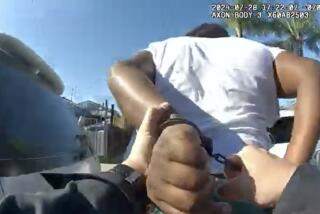Did ‘Django’ actress pre-judge LAPD officer?
LAPD Sgt. Jim Parker was enjoying a beer when a newscast on the bar’s TV showed a young woman he’d last seen in handcuffs. Actress Daniele Watts was accusing Parker of racial profiling during a routine stop in Studio City.
The cop had been disrespectful and rude, hassling her because she is black, Watts said. Her white boyfriend was spreading the story on social media.
The sergeant didn’t remember the encounter in quite the same way. He’d stopped the pair because they fit the description of a couple accused in a 911 call of lewd conduct. The man cooperated, but the woman refused to identify herself and stormed off, ranting about racism and constitutional rights.
Parker could see where this was headed as he watched the newscast: He was about to become the villain in a national racial-profiling drama.
“I said, ‘Oh man. This is ridiculous,’ ” he recalled. “I’ve got to stop this fast.” So the officer broke Police Department rules and provided an audio recording he’d made of the stop to TMZ.
The recording went viral, and public sentiment shifted: Parker was a strait-laced cop just doing his job. And Watts was a mouthy prima donna playing the race card.
::
Watts’ account played into a narrative that’s easy to believe. The LAPD has a reputation for racial profiling and a history of tense relations with minorities.
That’s why local black activists rushed so quickly to Watts’ defense — and why they backed off so publicly when they heard Parker’s evidence.
“I had a press conference outside of police headquarters and accused the LAPD of racial profiling,” said a chagrined Najee Ali. “Then I listened to the audio tape, horrified.” He called another news conference a few days later and urged Watts to apologize.
“Too many black folks have been actual victims of racial profiling and brutality,” Ali told me. “If we defend people who cry wolf … no one will take it seriously.”
Ali said Watts — best known for her role in the movie “Django Unchained” — embarrassed the black community with her sidewalk tantrum, profiling claim and refusal to show her ID to an officer who was only there because Watts and her boyfriend had made a spectacle of themselves in what looked to witnesses like a public sexual tryst.
“We came to the aid of someone who said she had been victimized,” Ali said. “Then we realized the race card had been misplayed in this particular case.”
::
The race card.
I wish we could retire that phrase and what it implies: that racial discrimination isn’t real, just some phony trump card that whiners flourish when the game is on the line.
The label stifles legitimate conversations about racial bias. We need to face an uncomfortable truth, validated by decades of research and statistics: The criminal justice system in this country is tilted against blacks.
That’s why, on some level, I can sympathize with Watts, who’s been carrying a grudge since she was 16 and witnessed police harassing her father.
Watts’ history may have primed her to see race at play in every law enforcement encounter. But that doesn’t make Parker a racist or excuse Watts’ boorish behavior.
Parker had barely said a word that afternoon before she went ballistic: “Do you know how many times the cops have been called … because I’m black and he’s white?” Watts shouted at the officer.
In fact, Watts was doing precisely what she has accused police of doing: prejudging someone because of their color — in this case, the color blue.
“It’s the uniform,” Parker told me. “It happens all the time. It doesn’t matter if it’s a black officer; he’ll be accused of racism, the same as me. It’s just the blue they see. … When people get in trouble or get caught, they look for any way out. That’s when the race card comes out.”
Watts has suggested that Parker might not have stopped the couple if she had been white. Maybe she’s right. But she’s wrong to judge the officer by what she imagines he might think or do. When cops do that we call it profiling — and rightfully condemn it.
Watts doesn’t seem to see the irony. She’s still portraying herself as a hero who courageously refused to provide police with her ID to protect the constitutional rights of regular folks, those without publicists.
LAPD Cmdr. Andy Smith said the department is investigating the claims of bias that the couple tweeted and posted on Facebook. Watts has not filed a formal complaint.
It’s not clear yet what will happen to Parker, who violated LAPD policy by sharing audio captured by a personal recording device he wears while on patrol. The department is wrestling with whether publicly airing officers’ tapes violates the privacy of those who don’t know they’re being recorded.
“In law enforcement, we see people at their worst moments,” Smith said. “They’re grieving, they’re angry, they’re devastated … I don’t think the public wants their saddest or most embarrassing moments put out on TMZ.”
Parker knows he broke a rule, but thinks it was justified. The alternative — letting the story spread unchallenged — might have escalated racial tensions and heightened risks to cops, he said.
And many people, officers and activists alike, are lining up on his side. “Jim is a folk hero to a lot of people inside and outside the department,” Smith said.
“Jim Parker himself changed the discourse in America from ‘the LAPD is a bunch of bigots and here, they did it again,’ to people saying ‘this woman is an idiot and that officer did a pretty good job.’”
sandy.banks@latimes.com
Twitter: @SandyBanksLAT
More to Read
Sign up for Essential California
The most important California stories and recommendations in your inbox every morning.
You may occasionally receive promotional content from the Los Angeles Times.










